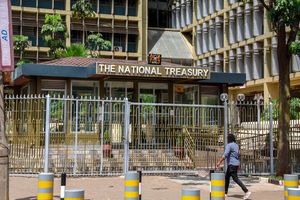Kenyans to get free treatment for cleft lip

A woman admires her new look after corrective surgery for cleft lip and palate on May 13, 2011. Many patients rely on free medical camps. PHOTO| FILE | NATION
The government has committed to eradicate neglected surgical diseases and neglected tropical diseases by 2030 through registration of patients and free treatment.
Speaking in Meru during the launch of an initiative to map and register patients with neglected surgical diseases such as cleft lip and palate, Health Cabinet Secretary Sicily Kariuki said that the Ministry of Health would support counties in eliminating the conditions.
This will involve door-to-door mapping and registration of patients for free corrective surgery.
Phase One of the programme kicks off in Meru.
LACK OF PUBLIC AWARENESS
“People with neglected surgical conditions live with stigma and are largely left out of nation building. There has been lack of public awareness and inadequate funding for corrective surgery.
But as a government, we are now committed to ending these conditions for equity and development,” said the CS, adding that the government plans to reach more than 7,000 Kenyans with cleft lip and palate through the initiative supported by Henry Family Advised Fund, The Global Alliance for Surgical, Obstetric, Trauma, and Anaesthesia Care (G4 Alliance), College of Surgeons of East, Central and Southern Africa (Cosecsa), Mount Kenya University and the Smile Train.
“Under the new strategy, neglected tropical diseases and neglected surgical diseases will be integrated into universal health coverage and the primary healthcare system.
UNIVERSAL HEALTH COVERAGE
We cannot achieve universal health coverage if some Kenyans are left behind,” added Ms Kariuki. She urged counties to train community health volunteers and equip hospitals to ease access to surgical services.
While launching the National Breaking Transmission Strategy 2019-2023, and unveiling the panel of experts, who will implement the strategic plan, Ms Kariuki noted that mass drug administration initiatives have led to the reduction of neglected tropical diseases such as elephantiasis and trachoma.
Meru Governor Kiraitu Murungi said that 14 doctors are taking surgical courses to ensure sustainability of the programme once the partners leave.
“We have equipped eight hospitals with theatres to facilitate the corrective surgery of people with neglected surgical conditions. We are also engaging 188 community health volunteers and 364 Meru Youth Service recruits to identify the patients. The volunteers have been given gadgets to register the patients,” said Mr Murungi.
Cleft lip and palate is a common congenital (present from birth) malformation affecting one in every 700 newborns.
Its cause is not well understood, but it is associated with genetics, nutritional deficiency (inadequate folic acid), smoking and drinking, and taking medication without prescription during pregnancy.
While it can be corrected with surgery, many parents can’t afford treatment for their children and rely on free medical camps targeting the malformation.
Last year during the Sixth Scientific Congress of the Pan African Association of Cleft lip and Palate in Nairobi, participants urged African governments to allocate adequate funds for the treatment of cleft lip and palate.
They noted that given that the cost of treatment is beyond the reach of many, and insurers (including the National Hospital Insurance Fund in Kenya) don’t cover the surgery, governments must step in to incorporate treatment into national surgical plans as part of universal healthcare.
Treatment is usually recommended during childhood, but the high cost keeps many out.
Apart from surgery, patients often need follow-up treatment, orthodontic care to ensure teeth grow in the right position and to align the jaw; and to deal with any tooth decay problems and speech rehabilitation/therapy if the child has speech or pronunciation problems.



